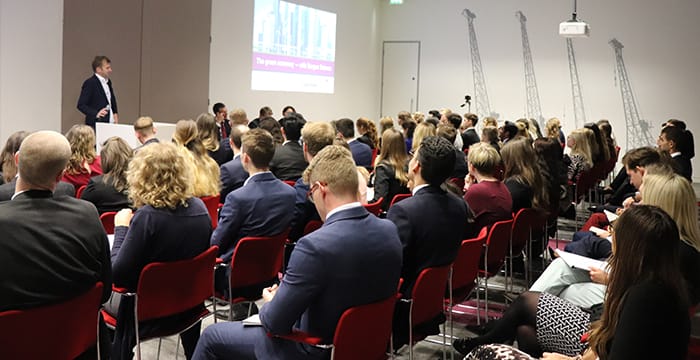A trio of Burges Salmon lawyers explain how the push towards a greener economy is affecting their clients

At Legal Cheek’s recent Bristol event, three lawyers at independent UK law firm Burges Salmon answered questions on the green economy, Extinction Rebellion and the impact of Brexit on the environment.
Tom Gillett, projects solicitor specialising in environment and energy; Stephen Lavington, projects senior associate specialising in environment and energy; and Rosamond Harris, real estate associate specialising in renewable energy, came together to take questions from 70 students. Here’s what they had to say.
How does environmental risk impact clients?
All of the panel agreed that their clients are taking serious note of the risk climate change can have on their businesses. Tom Gillett said: “Environmental issues are becoming recognised as a business risk and clients are taking note”.
This includes a financial risk for companies, as Rosamond Harris explained: “We act for funds which invest in green energy projects. There is also an increasing trend for ethical and green investing”. She went on to add that clients are also “taking stock” of which aspects of their business may be impacted by the results of climate change, for instance if they “have a warehouse in an area that could be flooded with rising sea levels”.
Stephen Lavington agreed, forecasting that “companies or parts of companies will become obsolete” with the policy changes coming in to combat climate change. He gave the example of the UK’s commitment to phase out coal by 2025, and the impact on generators relying on coal-fired power.
Grassroots organisations and Extinction Rebellion
The audience asked the panel their thoughts on Extinction Rebellion and the impact of grassroots organisations on their client relationships.
Gillett said that he agrees with the “central message” of Extinction Rebellion and went on to explain that you would “struggle to find an environmental lawyer who doesn’t agree that there’s a climate emergency”.
Lavington added: “Extinction Rebellion has had a huge impact on public perception of climate change, but legislation has been being built for years”.
They asserted that in areas such as environment, their clients drive the discussion. Generally, grassroots organisations like Extinction Rebellion begin a movement which drives a change in public opinion and the priorities of consumers, companies take note and begin to change their business practices, and then look to their lawyers for support and risk management of those changes. So, law firms typically are responsive to issues like climate change, rather than setting the agenda.
But they can influence their own suppliers, as Harris put it: “For a firm to make an impact they need to look to their own suppliers and try to drive the changes there. That’s part of having a meaningful sustainability policy.”.
Green finance and policy changes
The discussion then turned to financing the changes needed to reach the UK’s commitment to reach carbon net zero by 2050. An example that Ros used was electric cars: “There’s a chicken and egg scenario where investors don’t know whether to invest in the infrastructure or the production of electric cars as the return from one depends on the availability of the other”. She explained that “Currently it takes throughput of around 40,000 vehicles per day to support a charging point for electric vehicles”.

In response to this, Legal Cheek publisher Alex Aldridge asked: “Isn’t it the role of government to bridge this gap? So, shouldn’t the government fund the installation of charging points in rural areas?”
Harris replied: “The issue is so many areas are crying out for money so it’s very hard, that kind of roll out might help stimulate the process but we’re seeing this as primarily private sector-led”.
Gillett pointed out an apparent “disconnect” between what policy makers think needs to happen to achieve the goal of reaching net zero by 2050 and the “reality” of what will need to change.
The panel were asked if they could impact policy in their roles. They said it would “take a long time to reach that level” as a solicitor, referencing senior colleagues at Burges Salmon who are involved in various government taskforces. For now, they all expressed that their role is to interpret public policy and not to create or amend it.
Brexit and environmental policy in the UK
You can’t have an event these days without Brexit being mentioned. Sorry not sorry. Gillett had an interesting take on what might happen with environmental policy following our departure from the EU.
Gillett, having stressed that “no one really knows” what will happen post-Brexit, said that much will “come down to how much the UK diverges from its current policies”. Noting that much of EU environment law has historically been “driven” by the UK, he suggested that it is possible that the UK’s departure could disrupt the current political balance of the EU and, as a result, have a negative effect on wider EU environmental policy.
Career advice
“Have confidence in yourself. Put yourself out of your comfort zone and that confidence will naturally grow”, advised Harris.
Using a metaphor Gillett said that you can look at the Kyoto Protocol in 1997 (whose goal was simply to reduce carbon emissions) and the UK’s commitments now (net zero emissions) to see that sometimes you have to “go bigger”. He advised students to “challenge the status quo”.
Lavington concluded the session by urging students not to “be afraid of getting things wrong.” He continued: “It takes a while to find what you’re supposed to be doing”.
What advice would you give to your younger self?
'Don't be afraid of getting things wrong', is Burges Salmon LLP senior associate Stephen Lavington's top tip to trainee solicitors
Posted by Legal Cheek on Tuesday, 10 December 2019
About Legal Cheek Careers posts.

